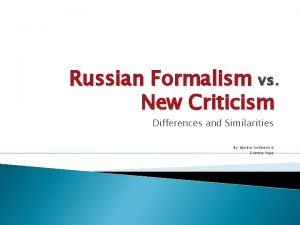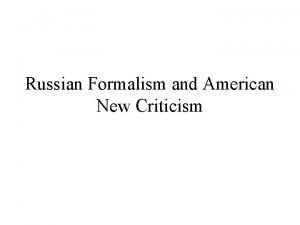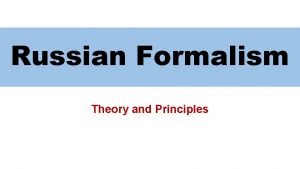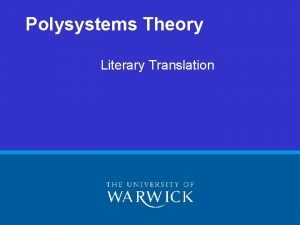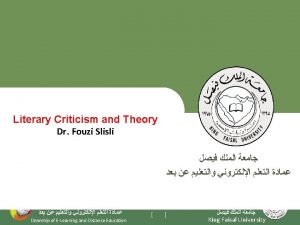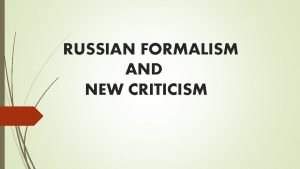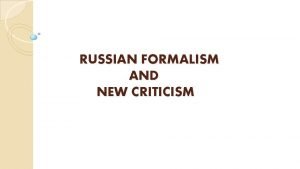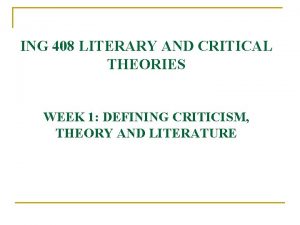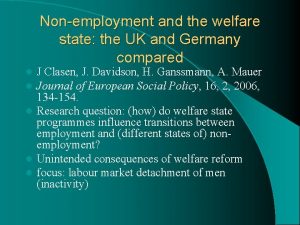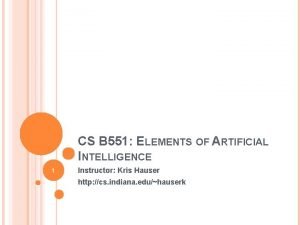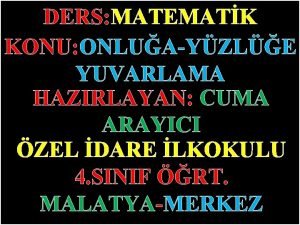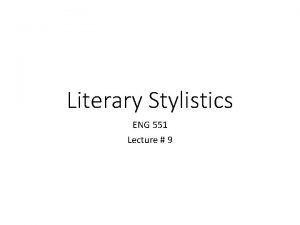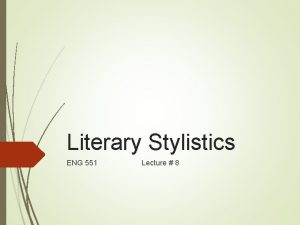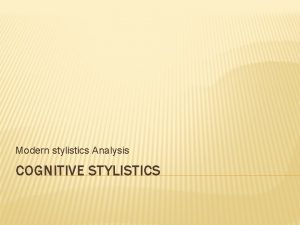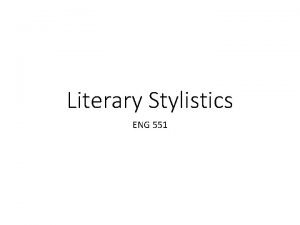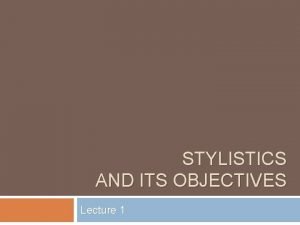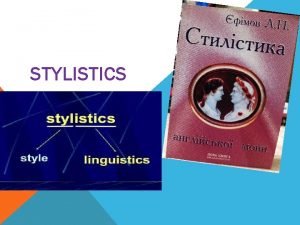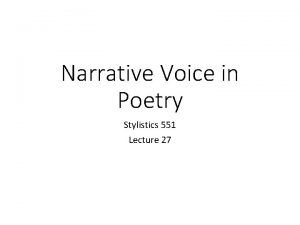RUSSIAN FORMALISM Stylistics 551 Lecture 6 Formalism Formalism











- Slides: 11

RUSSIAN FORMALISM Stylistics 551 Lecture # 6

Formalism • Formalism, also called Russian Formalism, 20 thcentury Russian school of literary criticism. • It began in two groups: Society for the Study of Poetic Language, founded in 1916 at St. Petersburg, led by Viktor Shklovsky; and the Moscow Linguistic Circle, founded in 1915.

• Many of the Formalists were influenced by the developments made in linguistics by the Swiss linguist Ferdinand de Saussure. • Formalists’ essays reflect predominant interest in linguistics. • Shklovsky remained concerned with literary theory rather than linguistics. (laws of economy in poetic language) Jakobson approached meter and thyme in verse.

• 1920’s onwards the formalists’ emphasis on the synchronic nature of poetic devices was gradually mediated by growing realization that literature and language should be considered with their diachronic contexts as well.

• Although the Formalists based their assumptions partly on the linguistic theory of Ferdinand de Saussure and partly on Symbolist notions concerning the autonomy of the text and the discontinuity between literary and other uses of language, the Formalists sought to make their critical discourse more objective and scientific than that of Symbolist criticism.

• Formalists placed an “emphasis on the medium” by analyzing the way in which literature, especially poetry, was able to alter artistically or “make strange” common language so that the everyday world could be “defamliarized. ” • They stressed the importance of form and technique over content and looked for the specificity of literature as an autonomous verbal art.

• Formalists remained committed to the idea that ‘literariness’ alone rather than the referent and its various contingencies, historical and otherwise, was the proper focus of literary scholarship. • In the USA formalism was followed as New Criticism that emphasized the literary text as discrete entity whose meaning and interpretation need not be contaminated by authorial intention, historical conditions, or ideological demands.

• They studied the various functions of “literariness” as ways to separate poetry and fictional narrative from other forms of discourse. Formalism was important in the Soviet Union until 1929, when it was condemned for its lack of political perspective. Later, largely through the work of the structuralist linguist Roman Jakobson, it became influential in the West, notably in Anglo-American New Criticism, which is sometimes called Formalism.

• Formalism views literature primarily as a specialized mode of language, and proposes a fundamental opposition between the literary (or poetical) use of language and the ordinary, "practical" use of language. • Central function of ordinary language is to communicate to auditors a message, or information, by references to the world existing outside of language. In contrast, literary language is self-focused, its function is not to convey information by making extrinsic references, but to offer the reader a special mode of experience by drawing attention to its own "formal" features—that is, to the qualities and internal relations of the linguistic signs themselves.

Approaches used by formalist analysts • Emphasis on autonomous nature of literature • Study of literature as neither a reflection of the life of its author nor as byproduct of the historical or cultural milieu in which it was created. • Define the ‘formal’ properties of poetic language (in both poetry and prose) • Special function of literary language is to reinvigorate language and to redeem it from the insipid and vapid state into which it sinks under the weight of everyday usage.

• Study the way in which certain aesthetically motivated devices e. g. ‘defamiliarization’ determines the literariness or artfulness of an object. • “Literariness” in formalism denoted a particular essential function present in the relationship or system of poetic works called literature.
 Formalism
Formalism Formalism new criticism
Formalism new criticism Russian formalism شرح
Russian formalism شرح Russian formalism examples
Russian formalism examples Russian formalism literary theory
Russian formalism literary theory Defamiliarization in animal farm
Defamiliarization in animal farm Formalism and new criticism
Formalism and new criticism Russian formalism
Russian formalism 01:640:244 lecture notes - lecture 15: plat, idah, farad
01:640:244 lecture notes - lecture 15: plat, idah, farad Number 551
Number 551 Csci-b 551 elements of artificial intelligence
Csci-b 551 elements of artificial intelligence 78 en yakın onluğa yuvarlama
78 en yakın onluğa yuvarlama
